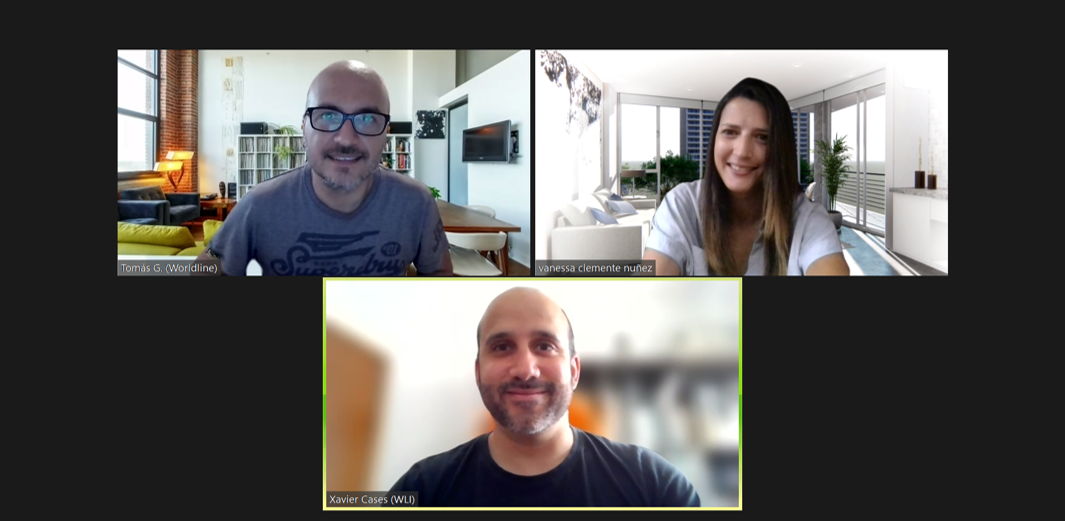For almost 3 years, Worldline Iberia, in Spain, has been a key member of the M-Sec consortium, acting as the European Coordinator of M-Sec. Meet their team and the work behind their involvement in the project, learn more about their role in M-Sec and where will they go next
We spoke with Vanessa Clemente, Business Developer at the Mobile Competence Center of Worldline Iberia, to know more about the company’s role in the M-Sec Project.
1. Vanessa, thank you so much for agreeing with this interview. Please briefly present yourself and the company you work at.
I am Vanessa Clemente. I hold a Bachelor’s degree in Business Administration from the University of Barcelona, and a Master’s degree in Global Management from the Antwerp Management School. Since 2015, I have been working for the IT sector and in 2018, I joined Worldline as business developer to generate solutions around mobile technologies and their digital ecosystem and as Project Manager for R&D Projects. In M-Sec I am the European Coordinator.
2. Why have you and Worldline decided to join (and coordinate) the M-Sec Project?
Worldline is the biggest European payment services provider and a leader in digital transformation. With annual revenues of €4,8 Bn and +20.000 employees worldwide, we empower society as we deliver our vision of a progressive transition towards a cashless economy in which digital payments will be fast, efficient, ergonomic and trustworthy. Our end-to-end digital solutions help our clients embrace the opportunities of digital interaction with their customers through payments, e-ticketing and omnichannel customer relationship management. Worldline is currently working on existing and future platforms around technologies such as Internet of Things (IoT), Artificial Intelligence (AI), Cyber Security, Biometrics or Blockchain, apart from many others.
Worldline invests very heavily on Research & Development, both via internal projects and via collaborative ones such as the ones included in research programmes such as H2020. In all of these projects, the objective is always to explore innovation in technologies and business applications that may enhance existing solutions/business lines or create completely new ones. In this sense, Worldline intends to maximize the short and medium term applicability of the developments done under the M-Sec project, so that they can be transferred to the market via future phases of M-Sec- platform or applying the developed assets to other projects.
There are many interests for joining a consortium such as M-Sec. First to collaborate with multiple partners from multiple industries. Second to gain strong expertise in aspects such as end to end security in the IoT ecosystem, conducting research to identify threats on security aspects and solutions that mitigate such risks and ensure integrity and reliability of the data collected through IoT sensors. And last but not least, to form part of building a solution such as the one of M-Sec that will drive new IoT Security Standards and Mechanisms on the smart city context.
3. Can you also present the team that works with you for the M-Sec Project?
In M-Sec, from the side of Worldline it should be highlighted the participation of Xavier Cases as the technical responsible for the development of the crypto companion database and the integration of M-Sec core assets to the solution of Use Case 2Home Monitoring Security System for ageing people. On the other side, Tomás GarcÃa, as the product owner of Use Case 2 and EU task leader for the exploitation activities around the solutions developed at M-Sec.
4. What has been the main role of Worldline at the M-Sec Project and have you been able to achieve all you have set for? What were your and your team’s main challenges?
Worldline, apart from being the European Coordinator, it also acts as one of the technical partners, contributing to identifying the requirements that must be covered by the M-Sec platform as well as participating in the implementation of the decentralized P2P level security. Worldline is also the owner of Use Case 2 Home Monitoring Security System for ageing people.
Fortunately we have been able to achieve everything we have set for, even though we still have to keep the focus on the last months left to achieve all what the consortium promised to do within the frame of M-Sec.
One of the main challenges faced has to do with how the Covid-19 has forced us to transform and adapt quickly to new ways of working and collaborating among members of the consortium in order to achieve deadline and milestones related with the M-Sec Project.
5. Looking back on what you and your team have done in the scope of the M-Sec Project, what are your main takeaways?
Main achievements from Worldline are related with the development of an asset called crypto companion database that combines the on-chain and the off-chain world, capable of encrypting personal data and generating a hash from the encrypted data which is automatically stored in the blockchain for data tamper proof reasons. Furthermore, Worldline has evolved its solution Connected Care, an IoT home monitoring platform used in Use Case 2, which provides higher levels of security thanks to the integration of multiple M-Sec components developed during the length of the project. Finally, at a coordination level, it is worth to mention the lessons learnt by working with multiple partners from multiple countries where the organization, planning and monitoring are key to keep the success of the project and achieve all the outcomes and milestones.
6. With only a few months until the end of the project, on what major developments do you and your team still need to focus? Do you feel confident?
Worldline is currently testing the M-Sec assets integrated on Use Case 2 before piloting the whole solution in a real scenario with Atenzia’s network users.
7. Did you find this experience of participating in an EU-JP partnership rewarding?
Of course! Being a mix of European and Japanese partners with different backgrounds and belonging to different types of organizations (research centers, universities, as well as companies in the area of Big Data, IoT, Cloud Computing, Blockchain,..) all of them with an extensive experience in smart city related projects it definitely brings a lot of opportunities to learn on multiple areas and to establish further collaboration opportunities.
Once the project concludes, Worldline intends to work on the following elements to capitalize on the developments achieved during the M-Sec project execution:
- Collaboration with partners that would like to continue with the technical and commercial development of the solution.
- Increase the commercial push of the Use Case 2 Home Monitoring Security System for ageing people in the health, insurance and Telco sector.
- Open potential collaboration with other consortia or solution providers that may complement the value proposition developed by M-Sec.


